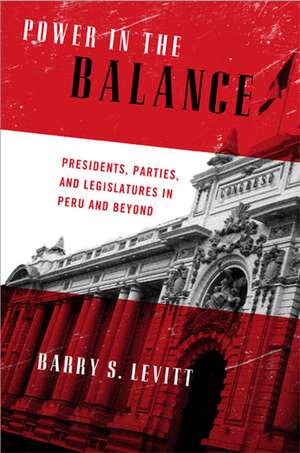Power in the Balance – Presidents, Parties, and Legislatures in Peru and Beyond: Kellogg Institute Series on Democracy and Development
Autor Barry S. Levitten Limba Engleză Paperback – 29 ian 2012
In Power in the Balance: Presidents, Parties, and Legislatures in Peru and Beyond, Barry S. Levitt answers urgent questions about executive power in “new” democracies. He examines in rich detail the case of Peru, from President Alan García’s first term (1985–1990), to the erosion of democracy under President Alberto Fujimori (1990–2000), through the interim government of Valentín Paniagua (2000–2001) and the remarkable, if rocky, renewal of democracy culminating in Alejandro Toledo's 2001–2006 presidency. This turbulent experience with democracy brings into clear focus the functioning of formal political institutions—constitutions and electoral laws, presidents and legislatures, political parties and leaders—while also exposing the informal side of Peru’s national politics over the course of two decades.
Levitt's study of politics in Peru also provides a test case for his regional analysis of cross-national differences and change over time in presidential power across eighteen Latin American countries. In Peru and throughout Latin America, Levitt shows, the rule of law itself and the organizational forms of political parties have a stronger impact on legislative-executive relations than do most of the institutional traits and constitutional powers that configure the formal "rules of the game" for high politics. His findings, and their implications for improving the quality of new democracies everywhere, will surprise promoters, practitioners, and scholars of democratic politics alike.
"Barry S. Levitt has delivered an important and original analysis of presidential power, legislative-executive relations, party politics, and rule of law in Peru from 1985 through 2006, advancing a fresh perspective on the strengths—and limitations—of institutionalist analyses in the fragile new democracies of Latin America. His book will be of great significance to scholars and students studying democratization and legislative-executive relations in the region."
—Scott P. Mainwaring, Eugene and Helen Conley Professor of Political Science and Director of the Kellogg Institute for International Studies, University of Notre Dame
| Toate formatele și edițiile | Preț | Express |
|---|---|---|
| Paperback (1) | 275.43 lei 6-8 săpt. | |
| MR – University of Notre Dame Press – 29 ian 2012 | 275.43 lei 6-8 săpt. | |
| Hardback (1) | 697.11 lei 6-8 săpt. | |
| MR – University of Notre Dame Press – 29 sep 2022 | 697.11 lei 6-8 săpt. |
Din seria Kellogg Institute Series on Democracy and Development
-
 Preț: 222.01 lei
Preț: 222.01 lei - 19%
 Preț: 450.29 lei
Preț: 450.29 lei -
 Preț: 365.21 lei
Preț: 365.21 lei -
 Preț: 277.23 lei
Preț: 277.23 lei -
 Preț: 277.53 lei
Preț: 277.53 lei -
 Preț: 173.49 lei
Preț: 173.49 lei -
 Preț: 284.82 lei
Preț: 284.82 lei -
 Preț: 299.65 lei
Preț: 299.65 lei -
 Preț: 243.30 lei
Preț: 243.30 lei -
 Preț: 279.23 lei
Preț: 279.23 lei - 27%
 Preț: 701.59 lei
Preț: 701.59 lei -
 Preț: 162.65 lei
Preț: 162.65 lei -
 Preț: 221.38 lei
Preț: 221.38 lei -
 Preț: 216.16 lei
Preț: 216.16 lei -
 Preț: 180.06 lei
Preț: 180.06 lei -
 Preț: 157.58 lei
Preț: 157.58 lei -
 Preț: 232.16 lei
Preț: 232.16 lei - 15%
 Preț: 456.46 lei
Preț: 456.46 lei - 23%
 Preț: 591.49 lei
Preț: 591.49 lei -
 Preț: 276.55 lei
Preț: 276.55 lei - 23%
 Preț: 588.22 lei
Preț: 588.22 lei -
 Preț: 199.49 lei
Preț: 199.49 lei - 27%
 Preț: 699.35 lei
Preț: 699.35 lei -
 Preț: 280.96 lei
Preț: 280.96 lei -
 Preț: 367.12 lei
Preț: 367.12 lei - 27%
 Preț: 697.53 lei
Preț: 697.53 lei -
 Preț: 205.64 lei
Preț: 205.64 lei -
 Preț: 464.59 lei
Preț: 464.59 lei -
 Preț: 443.72 lei
Preț: 443.72 lei -
 Preț: 243.30 lei
Preț: 243.30 lei -
 Preț: 254.37 lei
Preț: 254.37 lei -
 Preț: 324.83 lei
Preț: 324.83 lei -
 Preț: 354.99 lei
Preț: 354.99 lei -
 Preț: 200.26 lei
Preț: 200.26 lei -
 Preț: 325.43 lei
Preț: 325.43 lei -
 Preț: 177.57 lei
Preț: 177.57 lei -
 Preț: 173.91 lei
Preț: 173.91 lei -
 Preț: 300.58 lei
Preț: 300.58 lei -
 Preț: 252.64 lei
Preț: 252.64 lei -
 Preț: 275.40 lei
Preț: 275.40 lei -
 Preț: 244.94 lei
Preț: 244.94 lei -
 Preț: 298.67 lei
Preț: 298.67 lei -
 Preț: 156.23 lei
Preț: 156.23 lei
Preț: 275.43 lei
Nou
Puncte Express: 413
Preț estimativ în valută:
52.71€ • 54.83$ • 43.52£
52.71€ • 54.83$ • 43.52£
Carte tipărită la comandă
Livrare economică 14-28 aprilie
Preluare comenzi: 021 569.72.76
Specificații
ISBN-13: 9780268034139
ISBN-10: 0268034133
Pagini: 358
Dimensiuni: 151 x 228 x 23 mm
Greutate: 0.54 kg
Ediția:1st Edition
Editura: MR – University of Notre Dame Press
Seria Kellogg Institute Series on Democracy and Development
ISBN-10: 0268034133
Pagini: 358
Dimensiuni: 151 x 228 x 23 mm
Greutate: 0.54 kg
Ediția:1st Edition
Editura: MR – University of Notre Dame Press
Seria Kellogg Institute Series on Democracy and Development
Recenzii
"Barry Levitt's Power in the Balance is far more than a study of the separation of powers in Peru: the book is a welcome corrective to twenty years of institutionalist research on executive-legislative relations in new presidential democracies around the world. The study of formal rules can only take us so far. Levitt shows that the functioning of president-Congress relations is contingent upon the internalization of constitutional norms by relevant political actors, as well as on the ability of party organizations to channel these norms across successive electoral cycles and to constrain ambitious political elites. Levitt's insistence on meta-institutional variables will stand as an important contextualization of mainstream models of presidential democracy, generating important comparative insights into other transitional regimes such as Venezuela and Russia." —Timothy Power, University of Oxford
"Although there are many scholarly analyses of the first government of Alan García and even more of the government of Alberto Fujimori, no scholar has explicitly compared and contrasted these two governments with that of Alejandro Toledo. By highlighting the constraints upon García and Toledo that were posed by their own parties or electoral movements as well as by Peru's legislature—and the lack of such constraints upon Fujimori—Levitt is able to show clearly that the hyper-presidentialism of the Fujimori government was an exception. Levitt's descriptions of executive-legislative relations and of the major political parties during the three periods, which are based on an impressive spectrum of interviews with key political insiders and also on thorough archival research, are especially interesting and provide important new data and insights." —Cynthia McClintock, George Washington University
"Barry S. Levitt has delivered an important and original analysis of presidential power, legislative-executive relations, party politics, and rule of law in Peru from 1985 through 2006, advancing a fresh perspective on the strengths—and limitations—of institutionalist analyses in the fragile new democracies of Latin America. His book will be of great significance to scholars and students studying democratization and legislative-executive relations in the region." —Scott P. Mainwaring, Eugene and Helen Conley Professor of Political Science and Director of the Kellogg Institute for International Studies, University of Notre Dame
"This is an excellent book, which makes a pertinent contribution to the emerging literature on informal institutions in Latin America, to the general literature on political institutions and to the study of Peru, more specifically. . . . This book makes an important and insightful contribution to the literature on Latin American politics and executive behaviour. It provides a valuable corrective to the over zealous turn to the institutional in contemporary Latin American scholarship and highlights the nuanced analyses of political behaviour to be found in the examination of informal organizations and political norms." —Bulletin of Latin American Research
"Levitt offers key insights into an understanding of executive-legislative relations in countries where the rules in and of themselves cannot completely explain governance. In these countries—and perhaps everywhere—existing norms and the nature of the representative institutions also matter when it comes to balancing power between the different branches of government." —Comparative Politics
Notă biografică
Barry S. Levitt is assistant professor of politics and international relations at Florida International University.












